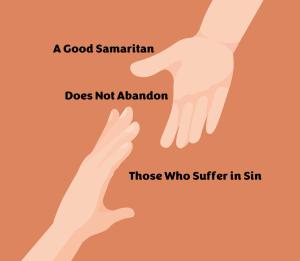I often write about sin. Sin is real. Sin causes untold suffering in the world. The afflictions of sin effects both the sinner and the one sinned against. I also write about fidelity to Church teaching on sin (and other topics). For me, if one seeks freedom from sin, one must follow the teaching of the Church to do so. Critics claim my approach smacks of doctrinal rigidity as necessary for the salvation of souls. Furthermore, my focus on sin and its cure does not help real people in the real world. They claim my views of the Church are tantamount to idolatry, as an appeal to “doctrinal rigidity” contradicts Jesus’ Golden Rule to “do to others” (Matthew 7:12) and the Parable of the Good Samaritan (Luke 10:25-37).
In this article, I show this type of criticism false. When interpreted properly, Jesus’s Golden Rule and the Parable of the Good Samaritan reflect my views of sin and freedom from sin found in fidelity to Church teaching. As the Good Samaritan tends to the man’s wounds, the Church tends to the wounds of people, both physical and spiritual. Spiritually, by the sacraments (oil and wine), the Church offers healing to those wounded by sin. To leave a person in their sin (among the robbers) does the person no ultimate good. Therefore, a truly Good Samaritan does not leave those wounded by sin to rot on the side of the road. They help.
The Good Samaritan Summarized
The parable concerns a traveler preyed upon by robbers. These robbers strip, beat, and leave the traveler half dead. Two religious (a priest and a Levite) come upon the robbed, naked, and half dead man and passed by on the other side. Eventually, a Samaritan (a looked down upon class of people) also comes upon the hurt man, has compassion for him, and administers aid. He binds his wounds, pours oil and wine on them, and takes him to an inn to recover. At the inn, the Samaritan pays for the injured man’s continued care and promises to pay more when he returns, if more payment is needed.
Who is My Neighbor?
Jesus tells the parable in response to the question “who is my neighbor.” This in turn comes after a lawyer attempted to test Jesus on how to inherit eternal life (Luke 10:25-29). The religious in the parable fail to show mercy to the hurt man. They choose to leave the man in his perilous state. Jesus does not say why, but scholars think it has something to do with touching something unclean. If the priest or the Levite had helped the man, the law required them to ritualistically wash. The Samaritan shows no such concern and takes pity on the poor man. He sees the man as a person in need and helps him. This parable, like all parables, uses a story to relate a spiritual truth, a spiritual meaning. Let’s take a look at that deeper meaning.
The Injury Caused by Sin
If we look at the parable of the Good Samaritan as it relates to sin, we see our role as neighbor does not limit itself to the merely physical. We, as a good neighbor, like the Good Samaritan, must assist our neighbors who are robbed, beaten, and left for dead by sin. If we pass those injured by sin and leave them in such a state, we cannot say that we acted in mercy and proved ourselves a good neighbor. Furthermore, our willful ignorance of their sin or an attempt to redefine sin as virtue (health) causes more harm. In this scenario, the priest and Levite come upon the injured traveler and declare them the image of health and vigor. “You are not injured or naked, my friend. You are expressing your lived experience. Bravo!”
The Good Samaritan Actualized
How do we actualize the example of the Good Samaritan in regard to those injured by sin?
Acknowledge (See) Sin
But a Samaritan, as he journeyed, came to where he was, and when he saw him, he had compassion. (Luke 10:33)
Like the Good Samaritan, we must acknowledge (see) the existence of sin and those injured by it. We must not look on those injured in judgement but through eyes of compassion. Some in our culture, and even our Church, think compassion is to be blind. They think love means encouraging a person in whatever makes them happy. If this includes encouraging a person to continue to injure themselves with sin, so be it. A Good Samaritan sees the sin (injury) and responds with compassion. A Good Samaritan does not leave the injured among the robbers.
Tend to the Wounds
He went to him and bound up his wounds, pouring on oil and wine. Then he set him on his own animal and brought him to an inn and took care of him. (Luke 10:34)
Moreover, once we acknowledge those injured by sin, we next must go to them and tend to their wounds. This means pointing them to Jesus the Healer, repentance, and forgiveness. Jesus offers spiritual healing through the sacraments of the Church (oil and wine).
1421 The Lord Jesus Christ, physician of our souls and bodies, who forgave the sins of the paralytic and restored him to bodily health, has willed that his Church continue, in the power of the Holy Spirit, his work of healing and salvation, even among her own members. This is the purpose of the two sacraments of healing: the sacrament of Penance and the sacrament of Anointing of the Sick.
Left in the Care of the Innkeeper
And the next day he took out two denarii and gave them to the innkeeper, saying, ‘Take care of him, and whatever more you spend, I will repay you when I come back.’ (Luke 10:35)
While we may tend and assist those injured by sin, true healing comes only from the ultimate Healer, Jesus Christ. Therefore, we must hand all the injured (including ourselves) over to the Innkeeper for long-term care. Those robbed, beaten, and stripped naked of their human dignity due to sin need time with Jesus to fully heal of their wounds. We may encourage and support them, both financially and through our prayers (our denarii), but only Jesus heals them.
1846 The Gospel is the revelation in Jesus Christ of God’s mercy to sinners. The angel announced to Joseph: “You shall call his name Jesus, for he will save his people from their sins.” The same is true of the Eucharist, the sacrament of redemption: “This is my blood of the covenant, which is poured out for many for the forgiveness of sins.”
True Mercy
Which of these three, do you think, proved to be a neighbor to the man who fell among the robbers?” He said, “The one who showed him mercy.” And Jesus said to him, “You go, and do likewise.” (Luke 10:36-37)
Likewise, in our analysis of the Good Samaritan, whom of the following proved themselves the neighbor of the person fell upon by sin:
- The person who ignores the sin of the person injured by it and turns aside?
- The person who redefines the sin of the person injured by it as virtuous health and lived experience, thereby encouraging the injured to further injury?
- The person who sees the person injured by sin, calls that person to repentance and forgiveness through Jesus in the sacraments, and leaves them in Jesus’ care for continued healing.
Of the three, only the third person shows authentic mercy and compassion. Only the third person proves themselves a true neighbor. Furthermore, only the third person truly practices Jesus’ Golden Rule to “do to others” as you would have them do to you.
In conclusion, a Good Samaritan tends wounds caused by sin. By calling the sinner to repentance and forgiveness in Christ, they allow for true healing of the Healer through the sacraments. To leave a person to their sin does that person no good but continued harm. Therefore, let us all be truly Good Samaritans that do not leave those wounded by sin to rot on the side of the road. Let’s reach out and help.
Thank you!
If you enjoy my writing and want to support my work, please consider donating $1 or any size gift by clicking here. Thank you!
Read my other writing here.
Please click the link below to join.
Voices of the Faithful in the Synod on Synodality
Please make your voice heard.
I Support Church Teaching in the Synod of Synodality














